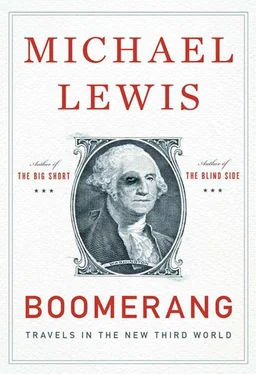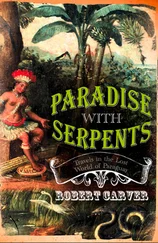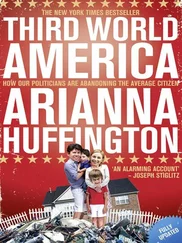THIS TIME KELLY sent his piece to a newspaper with a far bigger circulation, the Irish Independent . The Independent ’s editor wrote back to say he found the article offensive and wouldn’t publish it. Kelly next turned to the Sunday Business Post , but the editor just sat on the piece. The journalists were following the bankers’ lead and conflating a positive outlook on real estate prices with a love of country and a commitment to Team Ireland. (“They’d all use this same phrase, ‘You’re either for us or against us,’” says a prominent Irish bank analyst in Dublin.) Kelly finally went back to the Irish Times , which ran his piece in September 2007.
A brief and, to Kelly’s way of thinking, pointless controversy ensued. The public relations guy at University College Dublin called the head of the Department of Economics and asked him to find someone to write a learned attack on Kelly’s piece. (The department head refused.) A senior executive at Anglo Irish Bank, Matt Moran, called to holler at him. “He went on about how ‘the real estate developers who are borrowing from us are so incredibly rich they are only borrowing from us as a favor.’ He wanted to argue but we ended up having lunch. This is Ireland, after all.” Kelly also received a flurry of worried-sounding messages from financial people in London, but of these he was dismissive. “I get the impression there’s this pool of analysts in the financial markets who spend all day sending scary e-mails to each other.” He never found out how much force his little newspaper piece exerted on the minds of people who mattered.
It wasn’t until almost exactly one year later, on September 29, 2008, that Morgan Kelly became the startled object of popular interest. The stocks of the three main Irish banks, Anglo Irish, AIB, and Bank of Ireland, had fallen by between a fifth and a half in a single trading session, and a run on Irish bank deposits had started. The Irish government was about to guarantee all the obligations of the six biggest Irish banks. The most plausible explanation for all of this was Morgan Kelly’s narrative: that the Irish economy had become a giant Ponzi scheme, and the country was effectively bankrupt. But it was so starkly at odds with the story peddled by Irish government officials and senior Irish bankers—that the banks merely had a “liquidity” problem and that Anglo Irish was “fundamentally sound”—that the two could not be reconciled. The government had a report newly thrown together by Merrill Lynch, which declared that “all of the Irish banks are profitable and well-capitalized.” The difference between the official line and Kelly’s was too vast to be split. You believed either one or the other, and up until September 2008, who was going to believe this guy holed up in his office wasting his life writing about the effects of the Little Ice Age on the English population? “I went on TV,” says Kelly. “I’ll never do it again.”
KELLY’S COLLEAGUES IN the University College economics department watched his transformation from serious academic to amusing crackpot to disturbingly prescient guru with interest. One was Colm McCarthy, who, in the Irish recession of the late 1980s, played a high-profile role in slashing government spending, and so had experienced the intersection of finance and public opinion. In McCarthy’s view the dominant narrative inside the head of the average Irish citizen—and his receptiveness to the story Kelly was telling—changed at roughly ten o’clock in the evening on October 2, 2008. On that night Ireland’s bank regulator, a lifelong Central Bank bureaucrat in his sixties named Patrick Neary, came live on national television to be interviewed. The interviewer sounded as if he had just finished reading the collected works of Morgan Kelly. The Irish bank regulator, for his part, looked as if he had been dragged from a hole into which he badly wanted to return. He wore an insecure little mustache, stammered rote answers to questions he had not been asked, and ignored the ones he had been asked.
A banking system is an act of faith: it survives only for as long as people believe it will. Two weeks earlier the collapse of Lehman Brothers had cast doubt on banks everywhere. Ireland’s banks had not been managed to withstand doubt; they had been managed to exploit blind faith. Now the Irish people finally caught a glimpse of the guy meant to be safeguarding them: the crazy uncle had been sprung from the family cellar. Here he was, on their televisions, insisting that the Irish banks’ problems had nothing whatsoever to do with the loans they’d made . . . when anyone with eyes could see, in the vacant skyscrapers and empty housing estates around them, evidence of bank loans that were not merely bad but insane. “What happened was that everyone in Ireland had the idea that somewhere in Ireland there was a little wise old man who was in charge of the money, and this was the first time they’d ever seen this little man,” says McCarthy. “And then they saw him and said, Who the fuck was that??? Is that the fucking guy who is in charge of the money??? That’s when everyone panicked.”
ON THE MORNING of the day the Irish government planned to unveil a brutal new budget, I took my seat in the visitors’ gallery of the Irish parliament. Beside me sat an aide to Joan Burton, who, as the Labor Party’s financial spokesperson, was at the time a fair bet to become Ireland’s next minister of finance, the unnatural heir to an unholy mess. Down on the floor the seats are mostly empty, but a handful of politicians, Burton included, discuss what they have been discussing without intermission for the past two years: the nation’s financial crisis.
The first thing you notice when you watch the Irish parliament at work is that the politicians say everything twice, once in English and once in Gaelic. As there is no one in Ireland who does not speak English, and a vast majority who do not speak Gaelic, this comes across as a forced gesture that wastes a great deal of time. I ask several Irish politicians if they speak Gaelic, and all offer the same uneasy look and hedgy reply: “Enough to get by.” The politicians in Ireland speak Gaelic the way the Real Housewives of Orange County speak French. To ask “Why bother to speak it at all?” is of course to miss the point. Everywhere you turn you see both emulation of the English and a desire, sometimes desperate, for distinction. The Irish insistence on their Irishness—their conceit that they are more devoted to their homeland than the typical citizen of the world—has an element of bluster about it, from top to bottom. At the top are the many very rich Irish people who emit noisy patriotic sounds but arrange officially to live elsewhere so they don’t have to pay tax in Ireland; at the bottom, the waves of emigration that define Irish history. The Irish people and their country are like lovers whose passion is heightened by their suspicion that they will probably wind up leaving each other. Their loud patriotism is a cargo ship for their doubt.
ON THIS DAY, in addition to awaiting word on the budget, the Dáil (pronounced “Doyle”), as the Irish call their House of Representatives, had before it what should have been a controversial piece of business: to vote on whether to call elections to fill its four empty seats. The ruling party, Fianna Fáil, held a slim majority of two seats and, because they are universally believed to have created a financial catastrophe, an approval rating of 15 percent. If the elections were held immediately, they’d have been tossed from power—in itself a radical idea, as they have more or less ruled Ireland since its founding as an independent state, in 1922. Yet they successfully resisted the call to fill the empty seats, right up until they were tossed from power in February 2011.
Читать дальше












